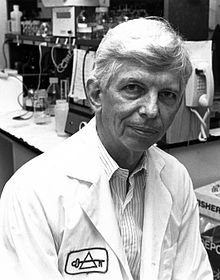Alfred G. Knudson
| Alfred Knudson | |
|---|---|
 |
|
| Born | Alfred George Knudson, Jr. August 9, 1922 Los Angeles, California, U.S. |
| Died | July 10, 2016 (aged 93) Philadelphia, Pennsylvania, U.S. |
| Nationality | United States of America |
| Fields | Genetics, Medicine |
| Institutions | Fox Chase Cancer Center |
| Alma mater | California Institute of Technology, Columbia University, California Institute of Technology |
| Thesis | Histidine metabolism in liver (1956) |
| Doctoral advisor | Henry Borsook |
| Known for | Knudson hypothesis |
| Notable awards |
William Allan Award (1991) Lasker award (1998) Kyoto Prize (2004) |
Alfred George Knudson, Jr. (August 9, 1922 – July 10, 2016) was an American physician and geneticist specializing in cancer genetics. Among his many contributions to the field was the formulation of the Knudson hypothesis in 1971, which explains the effects of mutation on carcinogenesis (the development of cancer).
Knudson was born in Los Angeles, California in 1922. He received his B.S. from California Institute of Technology in 1944, his M.D. from Columbia University in 1947 and his Ph.D. from California Institute of Technology in 1956. He held a Guggenheim fellowship from 1953 to 1954.
From 1970 to 1976, Knudson served as the Dean of Graduate School of Biomedical Sciences, University of Texas Health Science Center at Houston in the Texas Medical Center. He has been affiliated with the Fox Chase Cancer Center in Philadelphia from 1976 until his death in 2016.
Knudson is best known for his "two-hit hypothesis," explaining the incidence of hereditary cancers, such as retinoblastoma. Humans inherit two copies of every gene, one from each parent (except for genes on the X and Y chromosomes in males). Some people inherit one mutated version and one normal version of the retinoblastoma gene, which produces the retinoblastoma protein involved in controlling cell cycle progression. The inherited mutation is "the first hit." Over time, a mutation may arise in the normal version in one cell, thus producing "the second hit," which leaves the cell unable to control the process of cell division in an orderly manner, leading to cancer.
...
Wikipedia
